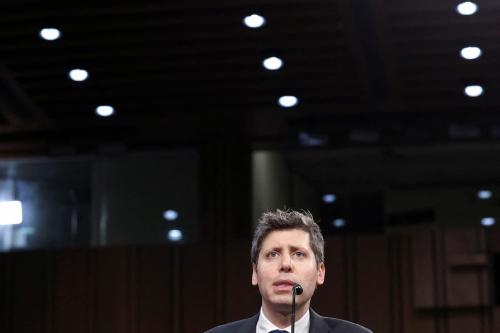Blockchain is often spoken of in conjunction with cryptocurrencies, elucidating ideas of “crypto bros” or volatile markets. The current administration has been quite vocal in its support of crypto but has not provided clear guidance on regulatory protections for consumers. While cryptocurrencies are gaining widespread attention, other sectors are looking to decentralized finance mechanisms, like blockchain, for the public good. However, even with blockchain, there are data privacy concerns that will require some level of regulatory oversight and compliance as use cases become more widespread.
What is blockchain?
Blockchain is a decentralized digital ledger that securely records transactions across an established, distributed network of computers. The technology can be compared to version history capabilities on shared documents: everyone with access can view, comment, and edit, and these changes are all recorded. This makes the technology generally tamper-resistant while also remaining collaborative, leading some to consider it the safest and most transparent decentralized digital structure.
These capabilities have great appeal to government record-keeping institutions that manage property titles, issue identity documents, track public benefits eligibility, and more. Because of its decentralized record-keeping feature, blockchain provides “a single view of the truth” that eliminates potential disagreements due to different ledgers, offering an “immutable, tamper-proof” form of record keeping.
These features can reduce the risks of tampering, fraud, or administrative errors, which are common concerns in traditional government databases. Some also suggest that blockchain’s reputation as a secure and transparent system may help restore trust in government institutions in critical processes, such as elections or asset management. Still, data privacy concerns surface in the use of any data that can be attributed to or deanonymized through blockchain’s implementation.
Blockchain in state and local governments
At least 19 states have established official study groups to research potential use cases of the technology. For instance, the California Blockchain Working Group was established in 2019 to evaluate “uses, risks, and benefits” of blockchain for the state. In the group’s final report, published in late 2022, the experts found major opportunities in blockchain-enabled credentials and record-keeping and urged state-level leadership to implement these technologies. California’s Department of Motor Vehicles has since used blockchain to digitize 42 million car titles and detect fraud, signaling openness to adopting the technology statewide. Sutter County, California, has also deployed blockchain to issue birth and death records to enhance efficiency, lower costs in the department, and improve customer experience.
Other cities and counties throughout the U.S. have also sponsored initiatives that use blockchain to streamline specific government processes. As early as 2018, West Virginia piloted a blockchain-enabled mobile application that sought to improve voting accessibility for members of the military and their families deployed abroad. The application records the votes onto a blockchain, which anonymizes and tracks the votes instantly, eliminating the hassle of absentee ballots that face frequent mailing delays.
Austin, Texas, began exploring a blockchain program in 2018 to assist the city’s homeless population in safekeeping personal identification documents. The city hoped the proposed program could allow it to replace paper records with encrypted electronic records, create a decentralized authentication system that would enable mobile verification, and build a database of personal records. However, reports from the city urged departments to move slowly on deploying the technology; growing privacy and equity concerns on digital identification have led to greater scrutiny.
More recently, the city of Baltimore introduced blockchain technology to better monitor the more than 15,000 vacant houses in its jurisdiction. Recording more than 200,000 property land titles and valuations, the platform tracks permits and simplifies the process of purchasing vacant property.
Non-U.S. uses
The U.S. is not the only government turning to blockchain technology in hopes of building more accountable and transparent governance systems. In fact, Sierra Leone was the first country to use blockchain in national elections in March 2018. The government hoped that the immutable quality of the technology would “create legitimacy around the election and reduce fall-out from opposition parties.” Similar to Baltimore’s program, the city of Dubai and the country of Georgia have both launched blockchain-backed systems to register land titles and property transactions.
Estonia, on the other hand, has integrated blockchain into a range of government processes through the digital platform e-Estonia, making it ”the world’s most digitally advanced society,” according to Wired. Estonian citizens carry blockchain-enabled mobile identification, replacing the slew of driver’s licenses, student identification cards, and subway passes typically held in a wallet. Estonia uses blockchain technology to “enforce the integrity of government data” and enable residents to gain more convenient and secure access to public services.
The need for privacy protections
The early-stage experiments in U.S. cities from Austin to Sutter County demonstrate how blockchain can address long-standing public administration challenges. However, these pilots remain localized and small in scale compared to Estonia’s comprehensive vision of blockchain-enabled governance. If governments could build technological capacity and public trust to implement these systems more broadly, blockchain would enable portable digital identities, statewide registries for land ownership, licensing, and compliance monitoring, and secure and accessible voting systems for citizens abroad.
Of course, this scaling requires updated legal frameworks, public-private collaboration, and thoughtful attention to digital equity and data privacy. Without regulatory guidance, local pilots face legal ambiguity when expanding across jurisdictions. Blockchain’s immutability, while valuable for security purposes, raises data privacy concerns that may conflict with state data privacy laws requiring the right to deletion. In the absence of a national data privacy standard, data assets connected to individuals and/or communities may facilitate greater identification through proxies, unnecessary collection of private and personal information, and potentially lead to increased cybersecurity breaches, especially by bad actors looking to exploit the government’s increased use of this technology. Additionally, digital ID systems and licensing platforms risk deepening inequality if they are inaccessible to communities without reliable internet or devices. The increasing number of digitally invisible people means that the accelerated migration of government services to online platforms forecloses their ability to take advantage of them.
As governments look to modernize public infrastructure through products like blockchain, equitable design and inclusive implementation will be the key to ensure that the technology serves the public good.
The Brookings Institution is committed to quality, independence, and impact.
We are supported by a diverse array of funders. In line with our values and policies, each Brookings publication represents the sole views of its author(s).









Commentary
Governments are turning to blockchain for public good—here’s how
June 16, 2025